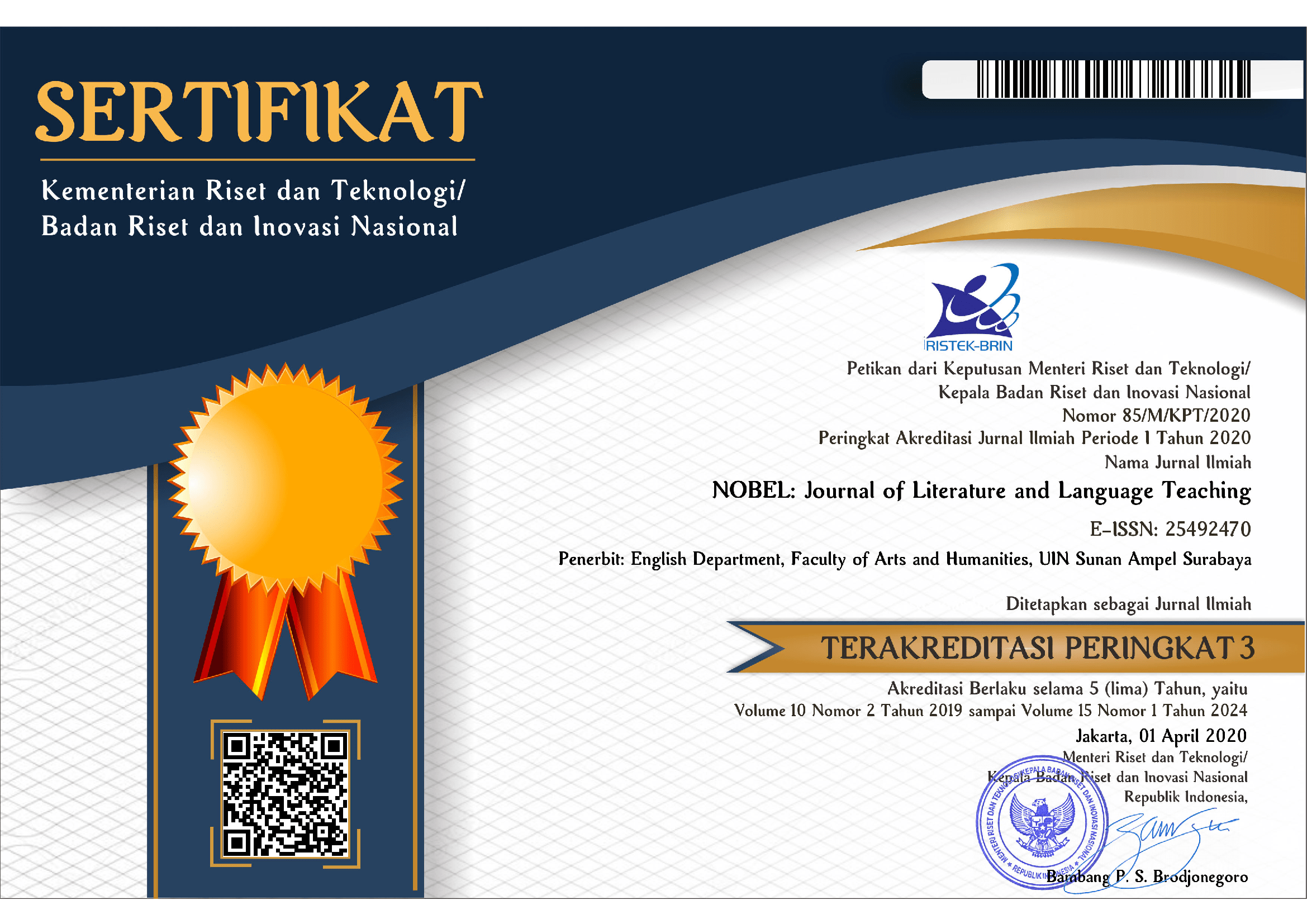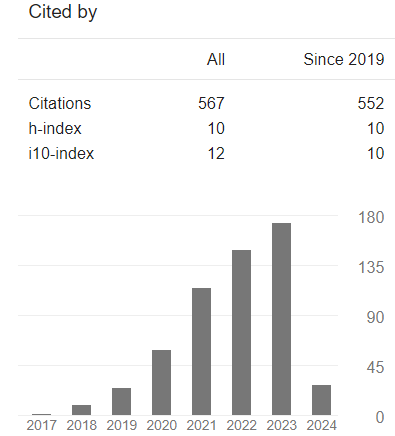Representative Acts in Dalia Mogahed's Speech "What it's Like to Be a Muslim in America"
DOI:
https://doi.org/10.15642/NOBEL.2022.13.1.83-97Keywords:
pragmatics; speech act; representative acts; speech; Islamic messagesAbstract
This present study aims to investigate various kinds of representative acts performed in Dalia Mogahed's speech entitled "What It's like to be a Muslim in America?" and to analyze the Islamic values that may be contained in the speech. As a qualitative research, the data of the current study were collected by searching and watching speech videos on Youtube and downloading the videos and the speech transcripts. In investigating the representative acts of Dalia Mogahed, this study applied Searle's (1976) theory of representative speech acts in analyzing the data in the forms of utterances produced by Dalia that were collected from Dalia's speeches. The data that have been obtained were then classified, analyzed, interpreted, and described. The results show that Dalia's 111 utterances were identified as representative acts, consisting of 54 utterances of stating, 32 utterances of describing, 10 utterances of asserting, 9 utterances of informing, 3 utterances of reporting and 3 utterances of predicting. The representative acts in Dalia's speech are reported to contain some Islamic messages.
Downloads
References
Akmal, S., Fitriah, & Zafirah, H. (2020). Illocutionary acts in religious discourse: The pragmatics of Nouman Ali Khan’s speeches. Langkawi: Journal of The Association for Arabic and English, 6(2), 130-142. https://doi.org/10.31332/lkw.v6i2.1938
Annahlia, K., Edward, E., & Fauzi, M. (2020). Analysing Zakir Naik’s illocutionary acts in his speech about Islam’s view on terrorism & jihad. Elsya: Journal of English Language Studies, 2(3), 88–92. https://doi.org/10.31849/elsya.v2i3.4942
Arsani, L. P. A., Juniartha, I. W., & Ariyaningsih, N. N. D. (2021). An analysis of representative speech acts used in covid-19 speech in Queen Elizabeth II. Elysian Journal: English Literature, Linguistics and Translation Studies, 1(1), 1–10.
Ashfira, K. D., & Hardjanto, T. D. (2021). Assertive speech acts in Donald Trump’s presidential speeches. Lexicon, 7(1), 24–39. https://doi.org/10.22146/lexicon.v7i1.64574
Birner, B. J. (2013). Introduction to pragmatics. Oxford: Blackwell Publishing.
Dalia Mogahed. (n.d.). Retrieved December 21, 2021, from https://www.ispu.org/dalia-mogahed/
Fadhilah, Hidayat, D. N., & Alek. (2021). An analysis of speech act on Bu Tejo’s utterances as the main characters in Tilik movie. Jurnal Ilmiah Aquinas, 4(1), 153-158.
Izar, J., Nasution, M. M., & Ratnasari, M. (2020). Assertive speech acts in mata najwa program of episode gare-gare corona. Lexeme: Journal of Linguistics and Applied Linguistics, 2(1), 53-58. https://doi.org/10.32493/ljlal.v2i1.6996
Jempa, N. (2018). Nilai-nilai agama Islam. Pedagogik, 1(2), 101–112.
Jumala, N., & Abubakar. (2019). Internalisasi nilai-nilai spiritual Islami dalam kegiatan pendidikan. Jurnal Serambi Ilmu, 20(1), 160-172. https://doi.org/10.32672/si.v20i1.1000
Mardawati, M. G. S., Padmadewi, N. N., & Myartawan, I. P. N. W. (2017). Language use: An analysis of assertive acts used by the eleventh grade students of SMA Negeri 3. Jurnal Pendidikan Bahasa Inggris Undiksha, 5(2), 1-12.
Milal, A. D., & Kusumajanti, W. (2020). Assertive speech acts performed by teacher in EFL classes. NOBEL: Journal of Literature and Language Teaching, 11(1), 83–100. https://doi.org/10.15642/nobel.2020.11.1.83-100
Muhtadi, A. (2006). Penanaman nilai-nilai agama dalam pembentukan sikap dan perilaku siswa sekolah dasar Islam terpadu Luqman Al-Hakim Yogyakarta. Jurnal Penelitian dan Evaluasi Pendidikan 8(1), 1-15. https://doi.org/10.21831/pep.v8i1.2008
Orin, K., & Issy, Y. (2016). Representative speech acts performed by the debaters in an English debate competition. English Education Journal, 6(2), 76–86.
Perdana, S. Y. (2017). An analysis of assertive utterance in Donald Trump’s speechs. Unpublished Thesis. Medan: University of Muhammadiyah Sumatera Utara.
Sapir, E. (2004). Language: An introduction to the study of speech. New York: Harcourt, Brace and Company.
Searle, J. R. (1968). Austin on locutionary and illocutionary acts. The Philosophical Review, 77(4), 405–424.
Searle, J. R. (1976). A classification of illocutionary acts. Language in Society, 5(1), 1–23.
Sugianto, A., Zulfa, W. K., & Purwanto. (2020). Assertive speech act in the Sang Kyai comic to teach religious value: A pragmatic study. Advances in Social Science, Education and Humanities Research, 477, 60–63. https://doi.org/10.2991/assehr.k.201017.014
Sugiyono, P. D. (2015). Metode penelitian pendidikan: Pendekatan kuantitatif, kualitatif dan r&d. Bandung: Alfabeta, cv.
Suryanti. (2020). An analysis of representative speech acts in “The Daily Talk Show” : Pragmatics approach. Unpublished Thesis. Batam: Putera Batam University.
Suryanti, Y., & Irma, C. N. (2019). Analysis of assertive speech acts on kick andy talk show program in “Save Indonesian Children” edition. Jurnal Handayani, 10(2), 29–36.
Veriza, R. A., Sukyadi, D., & Triarisanti, R. (2021). Assertive speech act of President Moon Jae-In’s speeches as a representation of South Korea diplomacy towards North Korea. Advances in Social Science, Education and Humanities Research, 546, 486–493. https://doi.org/10.2991/assehr.k.210427.074
Wray, A., & Bloomer, A. (2006). Projects in linguistics: A practical guide to researching language (Second ed.). London: Hodder Headline Group.
Yule, G. (1996). Pragmatics. Oxford: Oxford University Press.
Yule, G. (2010). The study of language (Fourth ed.). New York: Cambridge University Press.
Zakiah, D. (2018). Representative illocutionary act in an interview between Charlie Rose and Jack Ma (World Economic Forum). Unpublished Thesis. Jakarta: State Islamic University Syarif Hidayatullah.
Downloads
Published
How to Cite
Issue
Section
License
Copyright (c) 2022 NOBEL: Journal of Literature and Language Teaching

This work is licensed under a Creative Commons Attribution 4.0 International License.







